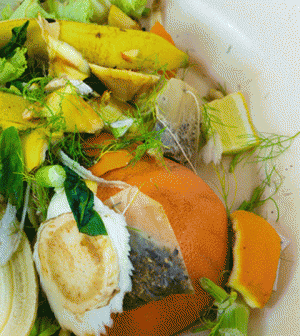- Finding Unshakable Power in a World That Wants to Pull Us ApartPosted 5 months ago
- What could a Donald Trump presidency mean for abortion rights?Posted 5 months ago
- Financial Empowerment: The Game-Changer for Women in Relationships and BeyondPosted 6 months ago
- Mental Health and Wellbeing Tips During and After PregnancyPosted 6 months ago
- Fall Renewal: Step outside your Comfort Zone & Experience Vibrant ChangePosted 7 months ago
- Women Entrepreneurs Need Support SystemsPosted 7 months ago
How to Use Food Scraps to Control Pests and Help Your Garden Thrive

By Cara Smusiak | Naturallysavvy.com
Gardens offer plenty of environmental and aesthetic benefits. But managing your garden can be tough on the planet if you’re using chemical fertilizers or pesticides. Pesticides can be dangerous. According to Beyond Pesticides, a national organization that advocates for pesticide-free lawns and gardens, studies have linked commonly used pesticides to human health effects such as cancer, birth defects, reproductive problems, neurotoxicity, liver damage, kidney damage, and endocrine (hormone) disruption.
But humans aren’t the only ones at risk. Wildlife exposed to pesticides can face behavioral abnormalities or even death, and in many cases, their food sources can become contaminated with chemicals. In addition, pesticides often kill benign insects as well as microorganisms in the soil.
Choosing to grow your plants organically is the first step to a healthier, greener garden and environment. It can seem daunting when you’re faced with an aphid infestation or when your soil needs a boost, but there are simple solutions. Compost is the easiest and cheapest way to develop a green garden. But not all foods have to chill out in the compost bin before they can be used, and in fact, some food scraps should be applied directly to your garden for the greatest benefit. Here are a few suggestions.
Read more: 5 Great Tips for Starting a Spring Organic Garden
Coffee Grounds
If you can’t live without your morning coffee, then chances are you dispose of a lot of coffee grounds. But if you’re throwing them in the trash, it’s really a waste. Coffee grounds are full of nitrogen, which makes them great for garden soil that needs a little boost. Sprinkle a think layer coffee grounds on your garden each week and watch your plants bloom.
Banana Peels
Bananas are a superfood. They’re packed with nutrients – including potassium – and that potassium is good for your garden. Banana peels also have a superpower: Aphids will do anything to avoid them. If you have roses in your garden, you know how destructive aphids can be, so banana peels offer fantastic natural pest control. Cut banana peels into small pieces (no bigger than a half-inch in length and width) and bury them around your rose plants. The pieces have to be small and you need to bury them at least a few inches below the surface to avoid attracting raccoons, skunks and other critters looking for a snack.
Orange Peels
Are there a lot of outdoor cats in your neighborhood? If you’re sick of your neighbors’ kitties treating your garden like a public washroom, there’s a simple solution: orange peels. Cats don’t like orange peels, so a sprinkling of orange peels throughout your garden will keep away your feline foes. Throw orange peels in your food processor to chop them up quickly and easily, then sprinkle on your garden.
Cucumber Peels
Cucumber isn’t just tasty; the cooling effect of the fruit has been mined for all sorts of beauty products. But cucumbers have another benefit: ants don’t like them. If you have a problem with ants coming into your home from a specific door, place some cucumber peels (cut side up) along the threshold of the doorway and few if any ants will be willing to cross the cucumber to get inside.
Read more: How to Get Rid of Ants Naturally
Garlic Peelings
Garlic adds a lovely flavor to foods, but it also offers plenty of benefits for your garden. Garlic repels many pests, such as aphids, several types of beetles, root maggots, and spider mites. Grind up garlic peelings in a food processor and lay flat to dry. Work a little of the dried garlic into the soil around plants.
So next time you’re looking for ways to deal with pests and ensure a thriving organic garden, look no further than your food scraps.






